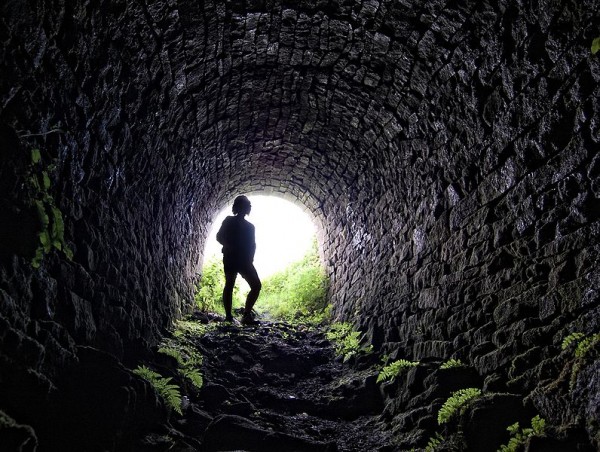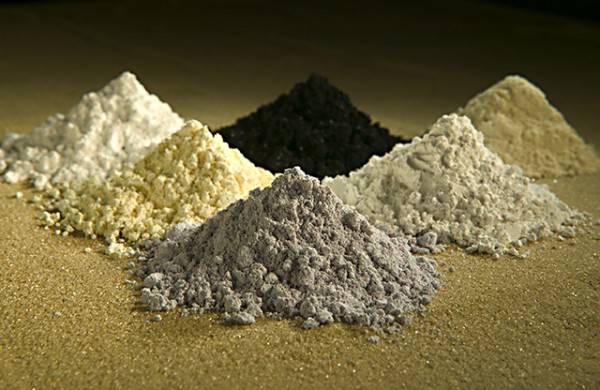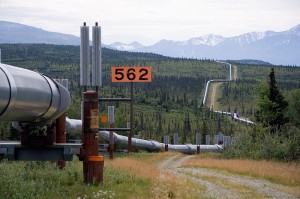This is a blog post by Drea Knufken.

Image: TJ Blackwell/Wikimedia
The earth is a hot commodity. If you’re an investor worth your salt, you want to be tracking earth-based commodities. And if you’re not an expert–or you haven’t scheduled yourself a year of unemployment to become one–you’ll want to take investment tips from someone who knows what they’re talking about.
Yet some experts only take a seated approach to investing. They read, sit at meetings, make phone calls, and ride planes that take them to more seated meetings, perhaps over food and with the occasional golf interlude.
Although Byron King does his time in a seat, his overall approach is more versatile. He might be deep inside of a rare earths mine in China one week, at an offshore oil conference in Houston the next, then visiting gold mining startups in South Africa after that. Byron, a geologist* by training but a polymath in practice, makes his living by taking a hard-hatted look at earth-based commodities investing, from large cap oil companies like BP to Canadian juniors, gold to hydraulically-fractured oil.
I caught up with Byron to learn more about the work behind his Agora Financial newsletters, Outstanding Investments and Energy & Scarcity Investor. Along the way, he shared his ideas on what makes Canadian culture better, how the US has regulated itself out of the global competition for resources, why oil takes so long to extract, and much more.
*and lawyer, and Navy pilot, and businessman, and historian…did I mention he’s a polymath?
Why do you travel?
St. Augustine once said “the world is a book, and those who do not travel read only one page.” I’m the energy and minerals guy for Agora Financial’s publications. My job is to know what’s going on in the energy world and the minerals world. I try to know as much as one person can know about a vast, globe-spanning topic like that.
In the course of my work, I spend a lot of time studying, learning, reading things like trade magazines and even textbooks on mineralogy and geochemistry. I also spend a lot of time on the phone talking with people, asking questions, thinking, analyzing; but in order to really understand what’s going on, they call it due diligence in the financial world, it’s an absolute necessity to get out and see things.
Seeing is learning. It’s talking to people, it’s examining the equipment, it’s getting a feel for the geography of where you’re working, whether it’s a mountain range or a ship out in the middle of the ocean.
You want to see as much as you can. I’m fortunate that I’m in a situation where I can do that.
It looks like you cover a variety of geological assets. Can you tell me a little bit more about that?
I’m a geologist by training, I’ve worked for oil companies, I’ve spent a lot of time in the Navy, traveling the globe. Several years ago I started writing freelance for Agora Financial, and about four years ago they said “hey, the guy that runs our energy and mining newsletter just quit, do you want the job?” I said, “Let’s talk.”
I cover the oil and gas industry in a lot of depth. For example, I probably know as much about the offshore and deepwater industry as anybody who’s not inside, collecting a paycheck. The difference between them and me is that I’m independent. I don’t get paid by the industry. There’s no conflict of interest. My interest is in getting the story right, and out to my subscribers.
I also know a lot about onshore drilling, oil sands, oil shale, shale gas, and the like. Then there are other things I’ve developed an interest in. In the past couple of years, I’ve become one of the go-to guys in a field called rare earths. These are 17 elements on the periodic table with exotic magnetic, optical, electrical and even electronic properties. They’re a hot item right now for a lot of reasons.

When you say they’re a hot item, does that mean that regular Joes investing in them right now would be ahead of the curve?
Well, the whole idea is to get people into investment ideas early. The reality of the market is that stocks go up and down. You want to buy as far down as your risk tolerance will allow.
Last year, for example, when the BP well blew out, a couple of my picks became household names. One of them was BP. Another was Transocean, the rig operator. Another was Halliburton. Another was Cameron International Corporation, which manufactured the blowout preventer. Within a couple days of that blowout, all four of those stocks were getting crushed.
About 3-4 weeks later, I told everybody to go buy them again. I said that this is a bad blowout. I said that I’m not making light of it. But the share prices for these companies were about as low as they’ve been in years, and they presented opportunities. I told people to buy BP at a low, Transocean at a low, Halliburton at a low, Cameron at a low. If investors took the plunge and bought those shares, they watched those stocks move upwards again.
The idea behind the recommendations was that, even with all the bad news about BP, Transocean, etc. they’re big, solid, cash-rich companies. These guys have lots of assets and lots of technical skills.
Quite frankly, if the world didn’t have a company like Transocean, with the world’s largest deepwater drilling rig fleet, you’d have to invent it.
The oil service company Halliburton has nothing to do, legally, economically, or emotionally with the Halliburton that Dick Cheney ran years ago. Bottom line is that Halliburton is one of the world’s great oil service companies. The world energy industry probably couldn’t run efficiently without it. To my mind, that makes it a great investment.
It gets back to the original point here. My goal is to place my readers ahead of the curve.
In a more current example, this month’s issue of Outstanding Investments is almost entirely devoted to deepwater oil development. I wrote it after I spent a week in Houston at the Offshore Technology Conference. Down in Houston, I was meeting and talking with people, checking out the latest, greatest, newest equipment.
Doing that — going places, seeing things, meeting people — allows me to give my readers insight and information that they can’t get in the mainstream media. The fact is you won’t find most of the things I talk about in the mainstream media, and you would really have to know where to look to find them in the professional trade and industry media.
In that sense, your $49/year Joe Average Investor subscriber could be three months, six months, one year ahead of the curve on some of the things I’m talking about.
Are most of the investments you recommend short term, medium term or long term?
I don’t dwell too much on the short term. There are good days in the office and bad days in the office. Short term is for day traders and market timers. Short term is day to day, week to week, a month or so.
I’d rather look at the medium and long term To my mind, medium term is about six months to 24 months. Long term is two years to five years.
When you look at some of these exploration projects, you have to think in terms of medium to long term, because just to drill one oil well could be a 5- to 10-year process. Building a mine takes a decade and more.
It works like this. Someone has an idea. They say, “Out in the ocean, or up here on the prairie, I think that there might be some hydrocarbons. Let’s drill a well and find out.”
OK, great. Now you’ve got to acquire the legal right to explore. Then you’ve got to explore. You have to do your basic geology. You’ve got to do geophysics and geochemistry. You have to put together a package. You have to raise money, eventually obtain a rig. Usually you don’t just hire a rig to drill one hole, because it’s expensive to obtain a rig. You’re going to drill 3, 5, 8, 10 wells. It’s an exploration and development program. You have to get out there and start drilling.
For an oil well, say, and depending on how deep your hole is, it could take a month. It could take 3 months. It can take six months. For some of the deeper stuff, it can take a year to drill these wells. Depending on the well, that could be a million dollars a day. Petrobras put about $200 million into one of its first deep wells far offshore of Brazil.
Above all this process teaches one to respect the calendar and how important it is to get things done in the proper order. You have to let the egg hatch. You have to let the thing happen. You have to understand patience, and accept the risk of development ideas.
I’ve noticed that you focus a lot on Canadian companies and Canada. Why is that?
Canada is the world’s second-largest country, in terms of geography, after Russia. There are lots of great resources in Canada.
What’s equally important — maybe more, really — is that Canadians have a different worldview than we in the US. The Canadians like to travel, they don’t mind working all over the world. It’s not something you see all that much in U.S. culture. So the Canadians train lots of mining geologists and engineers in Canada, and these guys go all over the world.
Let’s say you’re from Canada and you go to school there, you get a mining engineering degree or you get a petroleum degree. Maybe your first job out of college is at one of the Canadian mining projects in Ontario or you’ll go out west and you’ll work in Calgary in the oil business. The massive Western Canadian Sedimentary Basin is full of structures and traps and all sorts of things. If you can find oil out in the Western Canadian Sedimentary Basin, you can probably find oil anywhere.
The key point is that they train people extremely well in Canada. They have a mining and resource extraction culture there that, I would suggest, we abandoned in the US two generations ago. Canadians tend to go all over the world. You’ll find them in the most bizarre places, in the courthouses and ministries of countries that you can barely spell, working with people of every culture and tribe, and saying “let’s put a deal together.”
There’s a business process behind all this. The Canadian stock markets, the Toronto Exchange and what’s called the Toronto Venture Exchange, are all favorable to stock companies that want to raise money to do resource development.
The Canadians favor resource development much more so than in the US, where there are all sorts of capital restrictions and conduct requirements that make it hard. Over the past two generations, in the U.S., we’ve regulated ourselves into a state where it’s difficult if not impossible for the country, and maybe even the society and culture, to compete globally.
Canada doesn’t have that issue. They still have their laws and expectations; they have their conduct rules. If you’re a Canadian company, you can’t go to some other part of the world and pillage the ground and leave open strip mines or anything like that. You’re still subject to Canadian jurisdiction. In that sense, you’ll generally find that Canadians bring global best practices to the project.
Wherever they operate, the Canadians go out and they hire local talent—geologists and engineers, and equally important, they’re adept at working with the local politicians.
There’s a whole business culture built around this in Canada. And when you look at the best resource development places in the world, you’ll find Canadians there, along with British and Australians, and probably a few intrepid Americans who’ve learned the Canadian way.
Can you tell me a little bit more about how Canadian juniors work?
Canadian juniors are small, Canada-based resource developers. Their shares trade on the Canadian exchanges. At the junior development stage, a lot of times what happens is these smaller companies will go out and they’ll start finding resources — whether new discoveries, or just revisiting old plays from years past. By applying more modern exploration techniques, like seismic that didn’t used to exist or chemical tests that didn’t used to exist, they’ll bring some new concept to light.
At any rate, the idea is that some of these Canadian guys — SOME of them — make intriguing discoveries. There’ll be a mineral show on the side of a mountain. They’ll explore it, they’ll drill it, they might have a site for a potential mine.
Then, along comes a big mining company, Barrick Gold or Gold Corp. and they’ll buy that smaller mining company. It gets back to how it’s easier for a big guy to dig for gold on Wall Street than it is to actually go out there and try to find your own, gigantic new discovery.
There’s actually an entire business model built around generating prospects and it’s called the Prospect Generation Model. That is, there are small companies that may have six or eight or ten exploration plays in Brazil or Africa or wherever.
The prospect generator holds those plays, and places investment into each one. The company will do drilling, chemistry, geophysics. It’s taking the play from a patch of dirt on the far side of nowhere, and turning it into a marketable resource idea.
The goal is to get that prospect worked up to a point where you can then partner with a larger company that can bring in more people, more money, more political horsepower and turn your great idea into an active working mine.
At the end of the day, prospect generators leverage capital and human resources. They create new, mineable resources to sell to the fast-growing world where we live.
You said that about two generations ago, something happened to American mining. Would you elaborate on that?
For about a hundred years after the Civil War, there was a period of unprecedented innovation and economic growth in the United States. Admittedly it came at a price, and growing up in Pittsburgh, in the 1960s, I remember the smokestacks and pollution.
In 1962 Rachel Carson published Silent Spring and it brought about a sea change in the political culture in the US. People in a big way adopted the modern environmental culture. By the early 1970s we saw things like the establishment of the EPA, the Clean Water Act, things like that. We also saw things like the empowerment of individuals or groups to go into either state or federal courts and use environmental laws to essentially shut down resource development in the United States.
Were their goals worthy or unworthy? Well, who wants to argue against clean air or clean water? I like to breathe, I like to drink water. But as a result of this movement, across the US, the industrial side of the economy began to decline. We cleaned up the U.S. environment, after a fashion. We may or may not have cleaned up the earth. The jobs and the industries went someplace else.
It’s not that the US stopped using steel or copper, it’s that we exported much of the industry and got the steel and copper from other places. We exported the jobs, the technology, and to a large extent the pollution. You see that in China, where they have a much lower environmental standard than we do in the US.
Then, like Rip Van Winkle, we woke up two generations later, and realized that our economy is hollowed out. We have this great service economy where we’re all going to get rich giving each other haircuts, or doing each others dry cleaning or something.
All kidding aside, one of the largest industries in the United States is legal services. It’s something like 6% of GDP. That means we have a big piece of the economy resting on the “industry” of people litigating with each other. Where’s the new, primary wealth creation in all this?

Image: CCHarmon/Flickr
What do you mean when you’re talking about primary wealth creation?
For as long as there has been human history, the fact is that an economy has to create wealth. If you don’t grow it in a field, or pluck it off a tree, you dig it or pump it out of the ground.
When you don’t create new wealth, you’re living on past wealth. It gets into a lot of philosophical discussions about the merits and direction of the environmental movement. Of course it’s worthy to do things right, and operate in a clean manner. But is it also worthy to make it impossible for other people to do things, period? That’s a fair question.
Let me illustrate. I’m old enough to remember when the Atlantic Richfield Company (ARCO) discovered the Prudhoe Bay oil field up in the northern part of Alaska in late 1967. They found a massive oil deposit after drilling into an oil-bearing formation that was as big as a 50-story building. Nothing but oil-saturated rock, one of the largest oil fields in the history of the world, with tens of billions of barrels up there.
It was way above the Arctic Circle, in one of the most remote locales you can imagine. It’s 10 months of winter, and two months of just really cold and windy. So the oil industry immediately said “we’re going to drill it and we’re going to build a pipeline to transport the oil.” The environmental movement was just starting to flex its muscles. They went to court and asked for injunctions saying “you can’t do it.”
The oil industry actually bought the pipe for the Alaska Pipeline from two mills in Japan, because no American mill could roll pipe as big as they needed. So early on, there was all this pipe literally sitting out in the snow near Anchorage, waiting for people to build this project. But it was frozen in Alaska — literally and figuratively — due to environmental lawsuits.
The environmental battle went back and forth for a couple of years, and in 1973, we had the Arab-Israeli War, the Yom Kippur War, and the US sided with Israel. The Arab world said “Oh yeah? You’re supporting Israel so we’re going to embargo our oil exports to you.”
Basically at the end of 1973 the Arab world quit selling oil to the United States. That meant their oil tankers went to Europe and then other oil tankers went to the United States. It was really more of an oil routing issue than an oil scarcity issue. But due to the shock of the embargo, there were gasoline lines in the U.S.
The political message to Congress was “we need oil. We need it now. We’re building a pipeline.”
So Congress passed a law and it said we’re going to build a pipeline. Here’s the route. Anybody who opposes this pipeline, you have 30 days to file your suit in one particular court. That court has 90 days to decide the case. If there’s any appeal, the appeals court has another 90 days to decide the claims. Basically, within a period of months, all the legal claims went away, end of story. The pipeline was built.
They built the Alaskan pipeline, all 800-something miles of it, in about 3 years. If you’ve seen the Alaskan pipeline, it’s an absolutely astonishing piece of engineering. It crosses three 10,000-foot mountain ranges, it goes under several hundred river and stream crossings. It crosses the Denali fault system, which is larger than the famous San Andreas system of California.
Over the last 35-40 years or so, the country has benefited greatly from the Alaska Pipeline. The worst incident that ever happened was when a drunk guy shot a couple holes in the line with a high powered rifle.
I mention the Alaska Pipeline because we can say, factually and categorically, that it was a critical energy development project for the country. It’s been a net benefit to the country and to the world.
Yet in the beginning, the environmental movement almost killed the Alaska Pipeline. It almost never got built. It was only extreme events—an oil embargo in the country, people rioting in the streets over gasoline—that got the U.S. to pass a specific piece of purposeful legislation to build this important project.

Image: Luca Galuzzi/Wikimedia
So have we seen anything else like the Alaska Pipeline in the past 35 years or so?
I would say no to that. And your question and the answer gets into the need and nature of large-scale resource development. The U.S. is a big place, filled with lots of people who enjoy their standard of living. It’s “non-negotiable,” according to some politicians. To which I say, “Oh really?”
We spent the 1970s, 80s, 90s, and the 2000s in the US basically importing more and more oil from more and more foreign countries that don’t like us. We buy our copper elsewhere, we buy our graphite elsewhere, we import all of our rare earths from China. We’re at the mercy of a lot of other people for that “non-negotiable” standard of living.
Sure, there’s a lot of industry, a lot of manufacturing still in the US, but not as much as there used to be and ought to be. There are vast tracts of the country closed to development. You can say “well, it’s national park, it’s an important national monument for us.”
I’ll say well, okay, that’s fine, that’s a social and political decision we made. But by making that decision not to develop something, you’re also making the decision that we’re going to buy a product or resource from somebody else, from someplace else.
Who are these sellers? Well, there’s a world full of people who do business and send things to the U.S. They take our dollars—and they’re done so, so far, but we don’t know about the future. And they deliver the product to us. They’re going to give us what we need, when we need it, in the volume and quality that we want. Until they don’t. And then what?
Yes, it’s been a good easy generations. We’ve been able to get away with feeling pretty good about ourselves. We bask in the aura of our own moral superiority over everybody–hey, we have bigger national parks than they do or something. All while saying to each other that we’re not going to build that copper deposit, we’re not going to drill those oil wells, build pipelines or slurry mines or roads in this or that area.
That’s great. Congratulations to us, right? We can all feel good about that for a while, until we get to the point where the wheels start to fall off the economy. Then we get to the issue of peak everything. We get to where there’s not enough of what the economy needs, so the price for necessities goes up while more and more people drop out of the middle class into the growing, long term economic underclass.
Looking from the present, into the future? When we import oil into the U.S., it’s not our oil. We’re buying it from somebody else, which means they can sell it to somebody besides us. If some Chinese guy comes along and says “I’ll pay you more to load my tanker than those guys will pay you to load theirs,” guess who will get the oil?
The resource situation hasn’t quite gotten there yet, but we’re right on the cusp.
Which gets us back to my original question. Why do you travel?
I travel to see what’s really going on. When you get out there, you see the development that occurs in other parts of the world. You see people’s willingness to accept that development. And you come back to the US and you switch on the news and see that the culture is clueless about its foundations in the availability of resources. It’s bizarre.
If you go to most other countries in the world, the big oil company is likely some national champion, filled with the nation’s best and brightest scientists and engineers, as well as really good executives. In some places, they utterly revere their oil companies. I’m not saying we need to revere Exxon and Shell and Conoco, but I think we need to treat them with a certain element of respect that’s not there, not in the broad culture.
Here’s a comparison. When I was at the offshore technology development conference in Houston a couple of weeks ago, a senior executive from Petrobras gave a fascinating talk about what Brazil is doing to develop its offshore oil. The Brazilians have spent three years putting together a strategic plan for developing their energy resources 25, 50 years out.
Developing oil will be the industrial and political revival of Brazil. The Brazilians think that their oil and energy development will vault them into the ranks of a great nation of the 21st century. In fact, they’re thinking a century ahead into the 22nd century. They know where they’re going to build their shipyards, they know where they’re going to build their power plants, their rail lines, their telecommunications lines.
Right now, as we speak, there are kindergarten teachers in Brazil teaching little children about all the great things that are going to happen to them when they grow up and get a job in the Brazilian energy industry. They’ve completely revised the national curriculum, from preschool through college, to get kids interested in science, engineering, and energy development, interested in growing up and working in these fields.
So back to your question. I travel because it opens my eyes and shows me what the rest of the world is doing. It’s enlightening. I go to places in the world and meet interesting, accomplished people who are changing their world — and by extension changing our existence here in the U.S.
Then I come back to the US, where everything is so polarized. We don’t do big energy development here, not anymore. We don’t do big industrial development, not anymore. We turn shipyards into housing developments. We’re not creating primary wealth, we’re consuming the accumulation of past generations.
Whether you’re in the U.S. or elsewhere, any nation can only be the country it can afford to be. If you aren’t creating primary wealth, through resource development or adding other value, then you’re in trouble.
What travel has driven home to me is that, here in the U.S., we’re on the cusp of going broke as a nation. We’ve spent a couple of generations doing things we can’t afford to do. We’ve spent a couple of generations not doing things that we need to accomplish. The bill is coming due.

Byron King is the editor of Agora Financial’s Outstanding Investments and Energy & Scarcity Investor newsletters. He is a Harvard-trained geologist who worked for a major oil company for years. He is also an attorney. To boot, he spent years flying aircraft for the U.S. Navy, and served on the staff of the Chief of Naval Operations. You can find his work on Agora Financial and Daily Resource Hunter.
Drea Knufken is a freelance writer, editor, ghostwriter and content strategist. Her work has appeared in national publications including WIRED, Computerworld, National Geographic, Minyanville, Backpacker Magazine and others. For more information, please visit www.DreaKnufken.com. You can also find Drea via her blog, Facebook, LinkedIn and Twitter.

